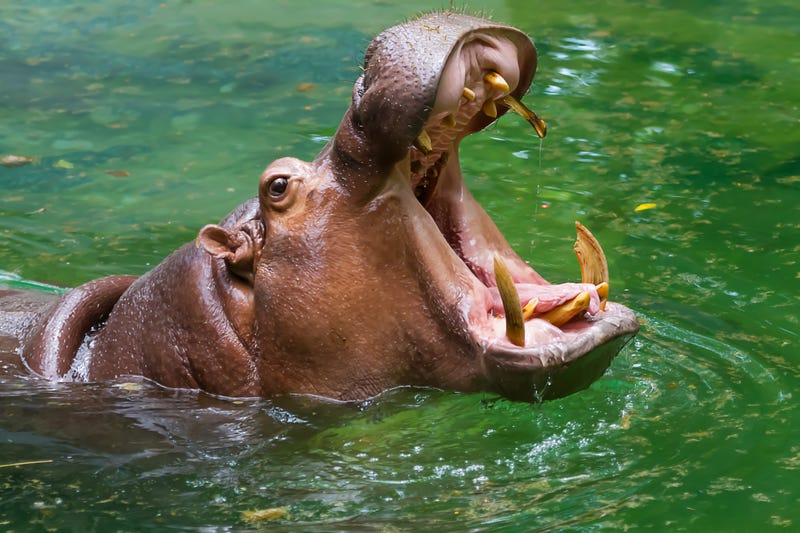
In a game-changing precedent for animal rights activists, a herd of hippos were recognized on Wednesday as "legal persons" by a federal court in Ohio.
The group of hippos is a famous one—they were once owned by Colombian drug kingpin Pablo Escobar, who kept a personal menagerie on his estate east of Medellín that included elephants, giraffes, zebras, and other big game.

When Colombian police killed Escobar in 1993, the government siezed the estate and its resident zoo animals—all except four hippos, which were deemed too difficult to capture.
They were left to their own devices on the land, and bred to an estimated of 120 in the years since.
Now, they are considered a major invasive species in the region. The sheer amount of excrement produced by the herd has been shown to alter the chemistry and oxygen levels of area waterways. They also pose a dangerous threat to neighboring communities. Hippos are responsible for an estimated 500 reported human deaths a year.
The Colombian government has weighed options for the herd's possible extermination for over a decade.
In July of last year, a Colombian attorney, Luis Domingo Gómez Maldonado, filed a lawsuit on the hippos' behalf to save them from being killed. Instead, Maldonado recommended sterilization.
Colombian officials agreed, and planned to use a chemical contraceptive developed by the U.S. Department of Agriculture on a portion of the herd. A local environmental agency began administering the contraceptive last week using dart guns.
A California-based animal advocacy organization, the Animal Legal Defense Fund, filed a legal application in intervention of the Colombian government's plan. The ALDF sought to depose two U.S. wildlife experts who specialize in non-surgical sterilization methods to testify on behalf of the hippos in their Colombian case. The experts say a contraceptive drug originally proposed in Maldonado's lawsuit is safer than the USDA option, which could be lethal to some of the animals.
The Colombian legal system does not allow for plaintiffs, human or otherwise, to compel U.S. residents to testify in domestic litigation. But there exists a U.S. statute that allows anyone who is an "interested person" in a foreign lawsuit to request permission from a federal court to take depositions locally.
"We applied for the hippos’ rights to compel [the experts'] testimony in order to support the Colombian litigation," ALDF attorney Christopher Berry told Gizmodo. "And now the [U.S. District Court for the Southern District of Ohio] has granted that application, recognizing that the hippos are interested persons."
The implication of the ruling could be precedent-setting. It marks the first time U.S. history that a federal court has recognized animals as legal persons in any context.
The movement for nonhuman legal rights, championed by animal rights organizations throughout the world, seeks to bestow certain legal protections enjoyed by humans on their furry (and feathery and scaly) counterparts.
"Animals have the right to be free from cruelty and exploitation, and the failure of U.S. courts to recognize their rights impedes the ability to enforce existing legislative protections," ALDF Executive Director Stephen Wells said in a statement on Wednesday. "The court’s order authorizing the hippos to exercise their legal right to obtain information in the United States is a critical milestone in the broader animal status fight to recognize that animals have enforceable rights."
In the U.S., that may now change. The ruling would likely impact other high-profile court battles involving animal plaintiffs, such as a lawsuit filed by the Florida-based Nonhuman Rights Project on behalf of an Asian elephant at the Bronx Zoo.

